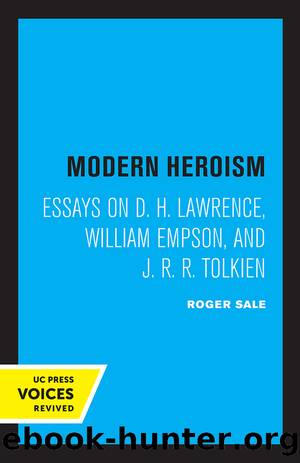Modern Heroism by Roger Sale;

Author:Roger Sale; [Sale, Roger]
Language: eng
Format: epub
ISBN: 9780520309906
Publisher: University of California Press
Published: 2020-12-14T00:00:00+00:00
IV. Tolkien and Frodo Baggins
With Tolkien we are back to the catacylsm of World War I, though his reply to the war was different from Lawrenceâs and was long delayed in taking its crucial shape. Tolkien was born in 1892, so that, though he was only seven years younger than Lawrence, he was still in college when the war started. His experience of the war, while much more immediate than Lawrenceâs, seems to have been essentially a schoolboyâs experience, as Lawrenceâs certainly was not. Tolkien had been orphaned in 1910 while a student at King Edwardâs School. He then went to Exeter College, Oxford, from which he was graduated in 1915, just in time, as it were, to join the Lancashire Fusiliers and serve in the trenches around Baupame, where there were very heavy casualties. When the war was over and Tolkien was recovering in a hospital bed in England, he discovered he had only one friend left alive. He has never said much about his wartime experience or his lifeâthe best available information can be found in William Readyâs The Tolkien Relation (1968) and Henry Resnickâs article in The Saturday Evening Post for July 2, 1966âbut we can gather that in its external details Tolkienâs life in wartime France resembled that described by Robert Graves in Goodbye to All That. But he said one thing later that seems to me crucial for an understanding of what happened and what kind of man he is: âA real taste for fairystories was wakened by philology on the threshold of manhood, and quickened to full life by war.â It is not an easy sentence to understand, but it has long seemed to me that no one need pursue his inquiry into Tolkienâs life any further than he needs to do in order to understand it.
The sentence itself was not written until 1938, and it may well be that it took Tolkien a full twenty years to realize what had happened to him. He seems to have withdrawn from the wounds and terrors of the war and all we think of as modern life. First, and as a prior condition to everything else, he became that most withdrawn of citizens, a philologistâhe was an assistant on the revision of the Oxford English Dictionary, reader and then professor of philology at Reading, a fellow of Pembroke College, Oxford, and finally Merton Professor of English Literature thereâwhich means that when Tolkien became a writer of fairy tales he was reflecting or expressing his deep absorption in words and older languages. In some sense withdrawing is integral to the life of a philologist, and it is doubtful if very many have ever become philologists without a need to withdraw or flee. He finds, and makes, orders, symbols, systems, traditions he can nurture so they in turn can nourish him. The lore, myth, and magic that surround ancient words can easily be made into a fortress against the modern world, where there is only tumid apathy with no concentration, men and bits of paper.
Download
This site does not store any files on its server. We only index and link to content provided by other sites. Please contact the content providers to delete copyright contents if any and email us, we'll remove relevant links or contents immediately.
4 3 2 1: A Novel by Paul Auster(11788)
The handmaid's tale by Margaret Atwood(7446)
Giovanni's Room by James Baldwin(6808)
Asking the Right Questions: A Guide to Critical Thinking by M. Neil Browne & Stuart M. Keeley(5355)
Big Magic: Creative Living Beyond Fear by Elizabeth Gilbert(5350)
Ego Is the Enemy by Ryan Holiday(4954)
On Writing A Memoir of the Craft by Stephen King(4660)
The Body: A Guide for Occupants by Bill Bryson(4580)
Ken Follett - World without end by Ken Follett(4441)
Bluets by Maggie Nelson(4259)
Adulting by Kelly Williams Brown(4231)
Eat That Frog! by Brian Tracy(4147)
Guilty Pleasures by Laurell K Hamilton(4115)
White Noise - A Novel by Don DeLillo(3828)
The Poetry of Pablo Neruda by Pablo Neruda(3813)
Fingerprints of the Gods by Graham Hancock(3731)
Alive: The Story of the Andes Survivors by Piers Paul Read(3728)
The Book of Joy by Dalai Lama(3694)
The Bookshop by Penelope Fitzgerald(3615)
